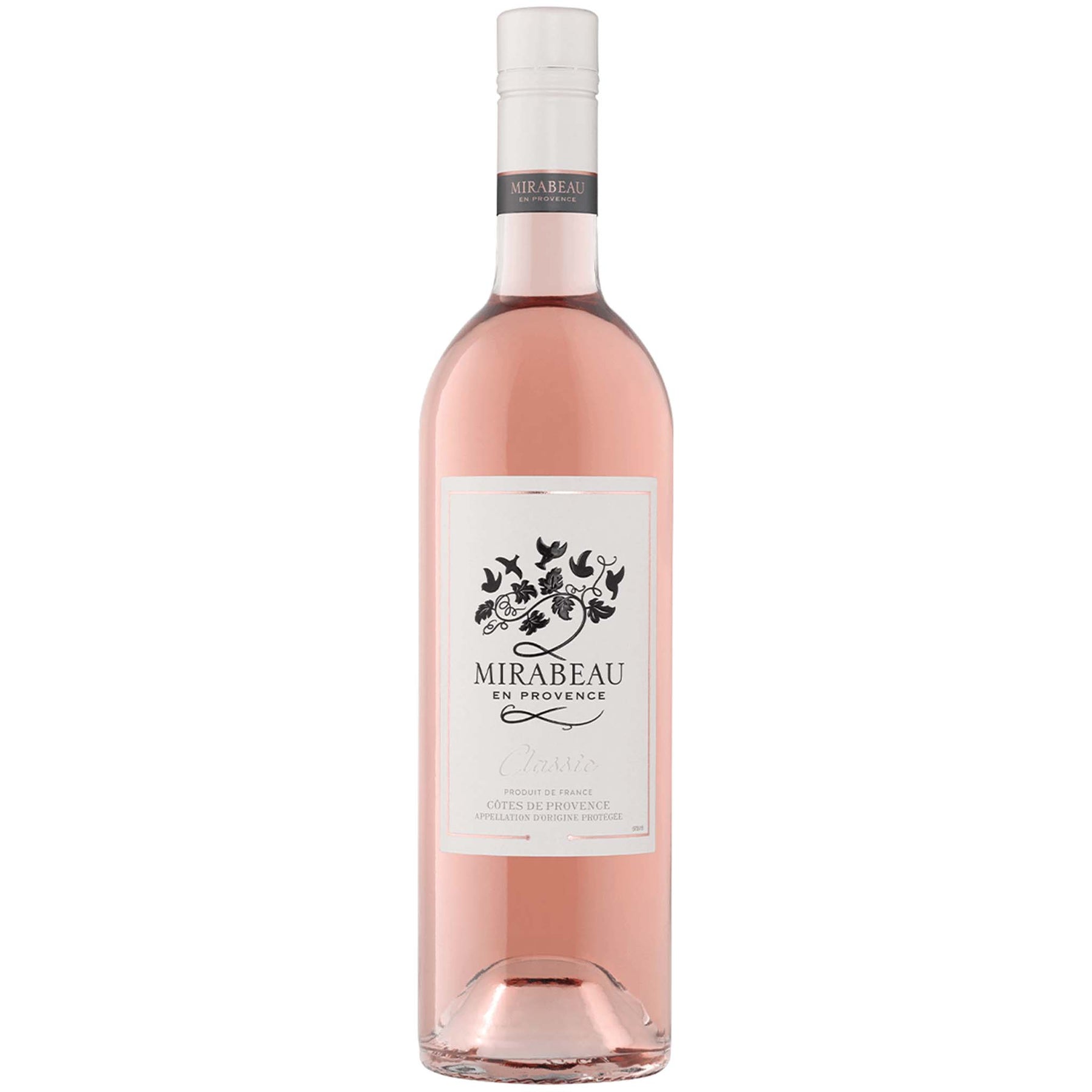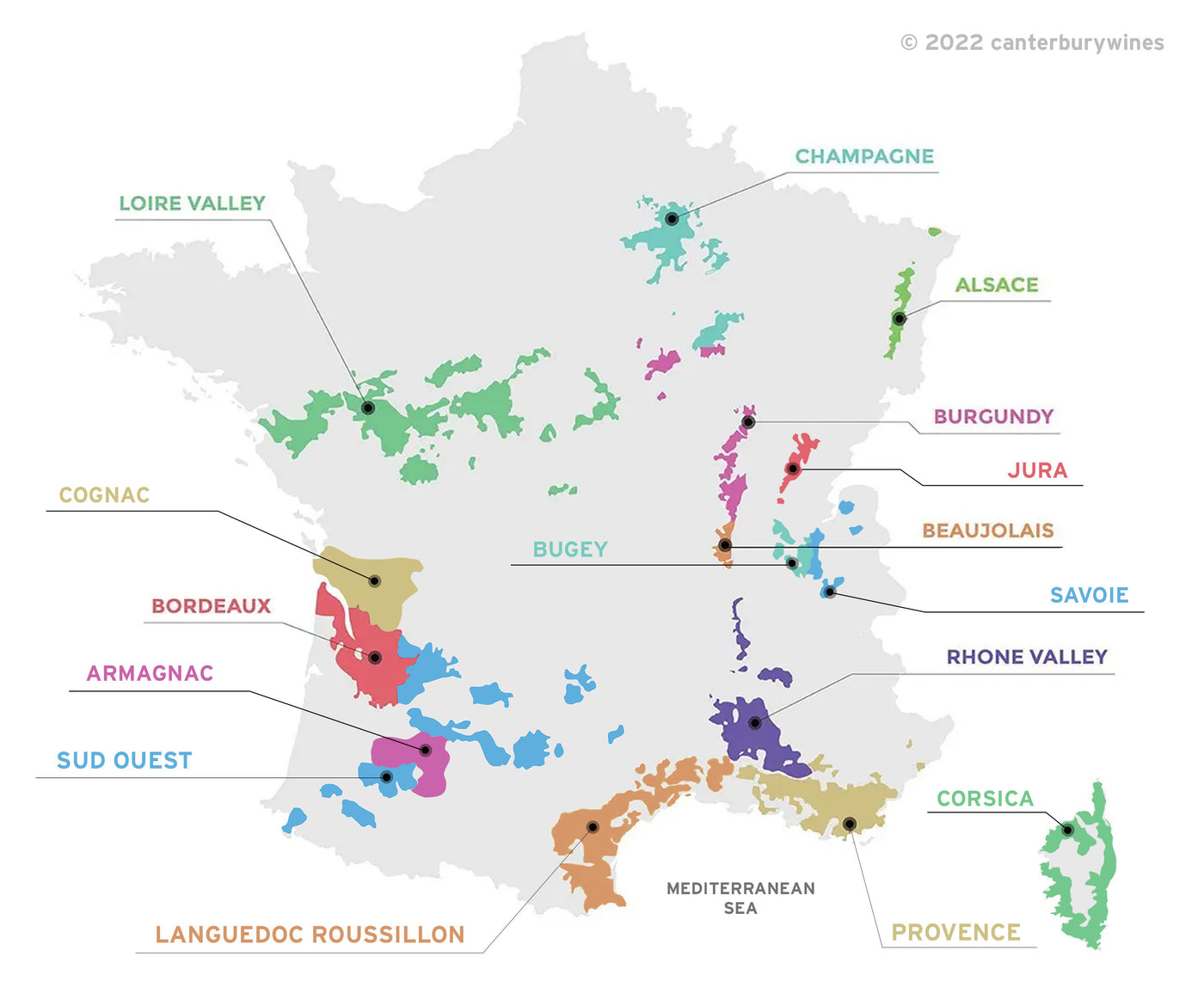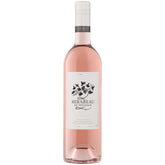
Mirabeau Classic Côtes de Provence Rosé 2020
Style: Rosé
Varieties: Grenache (60%), Syrah (30%), Cinsault (10%)
Closure: Screwcap
Mirabeau Classic Côtes de Provence Rosé 2020
Warehouse
34 Redland Drive
Vermont VIC 3133
Australia
Producer: Mirabeau
Country: France
Region: Provence
Vintage: 2020
Critic Score:
Alcohol: 12.5%
Size: 750 ml
Drink by: 2025
The 2020 Mirabeau Classic rosé, a blend of 50% Grenache, 40% Cinsault and 10% Syrah, is sourced from beautiful hillside vineyards to the south-east of Aix-en-Provence. A gorgeous pale salmon pink hue, this vibrant, classic Côtes de Provence rosé charms the senses immediately with a heady mixture of wild strawberry, red cherry and raspberry aromatics. Strawberry, cherry and raspberry flavours take centre stage on the elegant and balanced palate which has delicious fresh acidity and a sumptuous lingering finish. A real crowdpleaser.
"On the nose, ripe wild strawberries and raspberry compote, with a gentle spice note brought by the Syrah. On the palate, a feast of red summer fruits, a hint of pepper, with complexity, length and a fresh saline finish. A joyful rosé that will partner a host of dishes, especially spicy and aromatic Mediterranean foods." Mirabeau
Click on image to play video
Provence region

Provence, in the South East of France, is the rosé capital of the world. The region sits along the Mediterranean coast of France, bordered by the Rhone River to the west and the Côte d'Azur on the east. Physically, it's only about 150 miles long and 100 miles North to South, but its impact is profound.
Wine has been made here for over 2600 years, making Provence the oldest wine-producing region of France. It is also the only place to focus on Rosé - 88% of Provence wine production is dedicated to rosé! With mineral rich soils, 300 days of sun a year and the cooling Mistral winds, the Provence offers the ideal growing conditions to grow Rosé. Rosé from here is pale pink, dry, refreshing and savoury - very different to their Australian counterparts. The main grape varieties used in Rosé are Grenache, Syrah, Cinsualt and Mourvedre.
The Provence wine region is comprised of 9 main sub-regions or appellations (AOC -Appellation de'Origin Contrôlée). These appellations are shown in the map below.
The largest appellation is Côtes de Provence, which accounts for around 75% of the total production of the Provence region (of which 90% is Rosé). Second in size is Coteaux d'Aix en Provence, where Rosé is also king, which is heavily influenced by the Mistral winds. The most prestigious appellation is the much smaller Bandol. The vines in Bandol are planted on silicon and limestone soils, which together with the warm, coastal climate is very suitable for the late ripening of the Mourvèdre grape. Wines coming out of Bandol must contain more than 50% Mourvèdre in the blend whether they are Rosés or reds. Reds from Bandol are just as noteworthy as their Rosé counterparts.

The appellations of the Provence Wine Region
Stephen and Jeany

In 2008, we had a lovely life in South West London, three healthy children and were lucky to be surrounded by friends and family. Stephen was pursuing a promising career in telecommunications, having given up his small import wine business a few years before due to difficult economic times. In spite of outside appearances, Stephen found he was really missing the world of wine and the passion he found so easily within this tight knit fraternity of people, in love with their subject. As a couple we spent many years talking about moving to France and re-entering the world of wine, yet the moment never seemed just right. What became clear to us eventually, was that the perfect moment was never going to come, and if we wanted to leave, we had to make that moment happen. When Stephen was offered a promotion up the corporate ladder, it only galvanised his thinking. The moment was now and as a family we had to make the leap. So he asked for redundancy instead to turn our long-harboured dream into reality.
Rosé had been an important feature in our lives (Stephen proposed to me over a bottle of Rosado in Mallorca!) and we were big fans of the iconic Provence pinks. The region’s dry Rosés seemed such approachable and delectable wines, perfect with or without food, surely, we couldn’t be the only people feeling so in love with this style of wine? So once the decision to leave was made we quickly started to plan for our new future in the South of France.
After selling our beloved house, which I had only recently finished renovating, we left London in August 2009 at the height of the World Financial crisis! Friends and family were bemused and worried about the timing of our move, especially as economic headwinds would now be even more severe. But by then our decision was made. With barely a word of French spoken between us, our worldly possessions were packed up on the back of a truck and we finally headed south to a small village called Cotignac, in the heart of Provence.
We came down with a bump and realised we had a lot to learn in our new home, not just the foreign language, but take note of the cultural differences in work and social life. We hunkered down and spent the remainder of that year getting our bearings, properly learning to live the Provençal way, and criss-crossing the country searching and finding the best vineyards to work with. The next step was setting up a wine business with the principal objective of making a Provence rosé that would be regarded as one of the very best from the region, while building a brand that we hoped people would grow to love.
Once we had secured the Mirabeau name – inspired from our strolls around Aix- we added veteran UK Master of Wine, Angela Muir, to the team to make sure what we were making would be excellent. In 2010, we blended our first cuvée, Mirabeau Classic, and were beyond delighted to get a listing with UK supermarket Waitrose.
With Classic building a loyal following in the UK, we soon harboured more ambitions to make a range of world-class rosé wines. Over the last 11 years we have gradually grown our award-winning range to show interesting styles of wine from this region, whilst also having a bit of fun with innovation. Since the beginning we have thrown our heart and soul into the brand and focused on building engaging and innovative communications with our customers, especially on various digital platforms. We also wanted to bring the sunshine, food and lifestyle inspiration from Provence to people far afield and invite as many of you to come on our journey as possible.
We are proud to say that Mirabeau has evolved organically to become one of the most loved French rosé brands in the UK, Holland, Australia and more recently the US. We have also consistently been rated amongst the world’s best specialist winemakers, winning a host of medals and awards. The range is now available all over the world in some of the best retailers, bars and restaurants and boasts a very loyal following. Stephen and I are happiest knowing that our wines have become an integral part of people’s lives and are synonymous with friends and family having a great time together.
2019 marked the tenth anniversary of our big move to Provence and whilst still working with our loyal group of incredible growers, we have embarked on our own experimental farming adventure at our wine estate, Domaine Mirabeau. Set in a nature reserve not far from the Golf of St Tropez and surrounded by quintessential Provençal villages, the 20-hectare estate includes 14 hectares of vines and boasts an authentic Bastide and a newer farmhouse, which we have lovingly renovated and can be rented for a close-up experience of vineyard life.
Domaine Mirabeau reflects our hopes and dreams of being stewards of our land and farming in a way that is true to our beliefs. Honouring the position of this uniquely beautiful site, we have embraced ambitious farming practices and wine making techniques. We will transition the estate towards a future of regenerative farming and much increased biodiversity over the next few years and want it to serve to help others make the change to this more sustainable practice in viticulture. Stephen has co-founded the Regenerative Viticulture Foundation to bring more information on this style of farming that has so much potential for vineyards.
We are delighted to have released our first-single estate cuvée La Réserve from the Domaine and look forward to continuing to share our journey with you all as we embark on this next chapter for us and Mirabeau.
About the winery

The team at Maison Mirabeau
The Mirabeau story is one of following a dream and the pursuit of a deeply held passion for wine. Founded in 2010, Mirabeau has collected some of the most prestigious wine industry awards and Stephen and Jeany Cronk are delighted that people enjoy their wines all over the world.
After years of dreaming and scheming, Jeany and Stephen made the decision to leave the leafy suburbs of South London behind in exchange for the blue skies and sunshine of Provence. With three young children in tow, they held hands and leapt into the unknown. Armed with big ambitions to make a world-class rosé wine, and willing to challenge established wisdom, they founded Mirabeau. They embarked upon the ultimate family adventure and created one of the world’s most loved brands of rosé.
"Beautiful Provence is the world leader in producing dry, gastronomic rosé wines. Although the region boasts 300 days of sunshine a year, there can be vintage variations across this large and geographically diverse area.
Over the past eleven years, our close relationships with growers have allowed us to have access to over 2,000 hectares (5,000 acres) of prime Provence vineyards. And of course, this means we are able to source fantastic wines from different locations throughout the region.
Our lead winemaker Pablo Laborde was won over by the wine world at an early age having spent time his summer jobs growing up working in wine tourism, leading tastings and visiting winemakers and vineyard in his homeland of Argentina. Having started a degree in Chemical engineering he soon changed direction and obtained his National Diploma of Oenology.
Having gone on to specialise in Viticulture, his career to date has spanned several continents and some of the best wineries in the world. From Château Auzias in Carcassone, to working for the Familia Zuccardi in Argentina among the most famous wineries in the country and Château Auzias he went on to join LVMH working between Argentina and Spain before joining Cabinet d’Agronomie Provençale (CAP) and now Mirabeau as our winemaker.
Pablo has an excellent understanding of what people are looking for in a great rosé and is a skilled blender. He is detail driven and keeps a roving eye on all aspects of our winemaking, constantly working on ensuring that our wines are amongst the most distinguished from this iconic area." Mirabeau

France
There are 16 major French wine regions, each known for their own unique grape varieties, terroir and wines. They are Alsace, Armagnac, Beaujolais, Bordeaux, Bugey, Burgundy, Champagne, Cognac, Corsica, Jura, Languedoc- Roussillon, Loire Valley, Provence, Savoie, South-West and the Rhône Valley.
The largest region is Languedoc- Roussillon, the oldest is Provence, the most influential and famous are Bordeaux, Burgundy, Champagne, Loire Valley and the Rhône Valley.
French wine is labelled by wine region or appellation rather than by grape variety (except in Alsace). In order to guarantee the quality and provenance of French wines, the French government established the Appellation d'origine contrôlée (AOC) system. Under this system the wine label indicates the geographical origin, quality and, generally, the style of a wine. Many regions are home to multiple appellations; for example, the prestigious Bordeaux region in the southwest of France has over 60 growing appellations.


